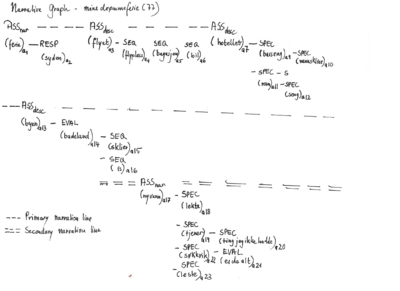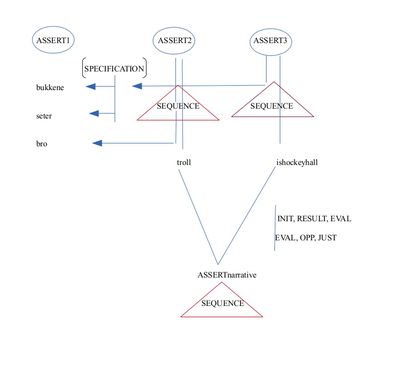Skrivesenter:Discourse Annotations and Discourse Structures
Moderator: Dorothee
Contents
http://typecraft.org/tc2/jsp/ntceditor.jsp?id=2200 Min dræmmeferie (5)
ASSnar
*familien
*badelandet ----SPEC--> ---SUPP--> ----SUPP--> -----SUPP-->> -----SPEC-->
*Thailand *delfin *is *vansklie *badelandet
-------EVAL *hai
*Katta (Np)
The discourse structure is flat, the main rhetorical elment is SUPP. Referential chains, where possible, are not esstablished.
http://typecraft.org/tc2/jsp/ntceditor.jsp?id=2397 - Min drømmeferie I (76)
Second Round of Annotations
Discourse Structure
ASS --> SPEC (OG) ----LIST(OG)--> -----LIST(OG)---> *fly til USA *Hollywood *Hollywood *sightseeing ----------> EVAL -----------REASON : bade *Disneyworld *byene kjendiser
. The discourse structure is flat, the main rhetoric element is LIST. The dominant keyterms are US city names. LISTs are lexicalised by the use of 'og'.
http://typecraft.org/tc2/jsp/ntceditor.jsp?id=2398 Min drømmeferie(77)
This is definitely a more complex text than the previous ones. The Narration Graph to the left gives some inside into its internal structure.
The narration graph reflects the text through its annotations which consist of tags for discourse relations, and the marking of key terms. Key terms relate to lexical units internal to discourse phrases. For example 'ferie' is internal to ASSnar and 'syden' is internal to RESP etc. Each key term carries an A(rgument) index.
First Round of Annotations
Cherise's observations
I have annotated another text - or tried to at least. The text was dream vacation 1 by number 77 entered by Pia.
In this text it seems like nearly every other sentence was a type of assert. I attempted to use react a few times but I think that this is a tag that may need to be added. I thought about using react for 14 and 16.
I am also uncertain how I should relate back to previous sentences when it is not the one directly preceding the phrase. I would have liked to related number 11 back to number 9.
Number 10 relates but it is a bit difficult to understand. How would you tag this sentence? O.k. I just gave this my best shot but I am sure that there is much to be learned so I welcome any comments.
Comments
I first should mention that I got rid of a duplicate sentence, so the sentence numbers have changed. But here my comments:
- I had only 3 ASSERT and then more SPEC and SEQ. The text has a very dominate time line, I thought.
I have added my tags under Cherise's. I do not think that one is right and the others wrong, but that several specifications can apply.
- I will add REACT to our tag list. I was wondering when REACT applies: should it be used when something is meant as a reaction to what another fictive character does, or can it also refer to an evaluation of a situation, or the expression of a sentiment. Sentence 12 and 14 express a sentiment. Should that also be tagged as REACT?
Here is the definition of React: Pysical or mental actions or changes of state of animates which result from previously introduced actions, events or states. They are differentiated from Reult in that they can be subjected to choice. Is this helpful? -Cherise
- Sentence 9 should be related back to 7. We cannot do that yet.
- Sentence 10 is now 8, I think. I read it more like a SPEC and a SEQ, and have added these tags.
- I find it useful to have what I have called "keywords" for now. This are things that are central in ASSERTs. In this text we have for example: Fly, hotell, badeland, popstjernebil.
--Dorothee Beermann 11:50, 16 October 2013 (UTC)
Bukkene Bruse (69)
Bukkene Bruse is the first text that we annotated together using the new set of tags (Do we have a reference to the source of these tags?).
I thought it might be a good idea to copy the tags (mostly in the way that we had assigned them) directly into the text in order to get a better idea of the text's discourse structure. This is what I got:
First Attempt
De tre bukkene Bruse på hockey.
ASSERT Det var en gang tre bukker som skulle til seters å gjøre seg fete, SPECIFICATION (BUKKER) og alle tre så het de bukkene Bruse. SPECIFICATION (SETER) På veien var det en bro over en foss, ASSERT SPECIFICATION (BRO) og under den broen så bodde et stort, fælt troll. ASSERT Men den største bukken hadde hørt at en splitter ny, ultramega, giga, super ishockeyhallen
Not annotated Så sa han det til de andre, så sa den mellomste bukken, kan vi dra dit, vær så snill snille bror. Ja, det kan vi godt, sa den største bukken. Yes, sa den mellomste bukken. Men, sa den minste bukken.
EVALUATION (ISHOCKEYHALL) Jeg har hørt at det lukter så fælt der inne. OPPOSITION Samma det, sa den største bukken. JUSTIFICATION Vi er ikke super-luktere heller.
SEQUENCEtemp Så når de (BUKKER) hadde gått 5, 32, 51, 63 nanometer SEQUENCE så møter de (BUKKER) hockeyspillerne Sidney Crosby og Mats Zuccarello Aasen SPECIFICATION (Aasen) som er skadet. Han (Aasen) skadet håndleddet.
INITIATIVE Så sier Zucca, vi kan spille mot hverandre. RESPONSE Ja, sier Crosby. RESULT NHL-gutt vinner 1st 65-3, 2nd 21, 3rd 250-2. EVALUATE Looser, sier Crosby til den minste bukken.
ASSERTnarrative CONTRAST Men så kommer trollet og knuser det isfylte og brede anlegget i 80 biter. SEQUENCE Så hooker trollet ned Zucca så han brekker det andre håndleddet, som det første. SEQUENCE Så fikk trollet 2 min utvisning for interference, SPECIFICATION (Interference) som er å takle noen som ikke har pucken. SEQUENCE Så må Zucca på sykehus med jagerfly. CONTRAST Men sykepleierne greier ikke å pleie han, RESULT så er karrieren slutt for Zucca.
ASSERTnarrative Når det dramatiske fallet skjedde SUPPLEMENT den 27. jan og det var den 30. jan SEQUENCE RESULT så ble Zucca frisk igjen, SEQUENCE LIST RESULT og så ble Crosby frisk igjen. SEQUENCE CONTRAST Så rev trollet ut innmaten, pirket ut øynene og drepte Crosby. Ha, ha, ha. Snipp snapp snute så var eventyret ute.
Discourse Structure
Evaluating the list of tags, it might seem as if they describe a flat discourse structure (the relations follow each other, and they seem to be on the same level), but that is clearly not the case. The following graphical representation (Figure 1) gives a first impression of the text's narrative structure.
Figure1
The text contains three main assertions which provide the anchor points of the narration that unfolds. The first assertion (ASSERT1) is of a descriptive nature. It introduces main locations and the main characters: the bro and the bukkene. ASSERT2 is more narrative, and introduces the antagonist. ASSERT3 is also narrative and introduces a new 'sachverhalt' altogether. For each of the ASSERTs we find SPECIFICATIONS, but in particular for ASSERT3 we find internal discourse structure, such as- SEQUENCE, SEQUENCE ...
- INITIATE, RESULT, EVALUATE or
- EVALUATE, OPPOSITION, JUSTIFICATION
It seems from the annotations that ASSERT3 is the strongest of the anchoring points for this text, as it heads most of the subordinate discourse structure.
What other observations are possible?
We also could ask: For which questions would we want an answer, and has our annotation brought us closer to finding these answers?
--Dorothee Beermann 19:37, 30 September 2013 (UTC)

